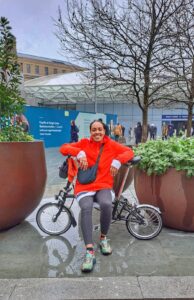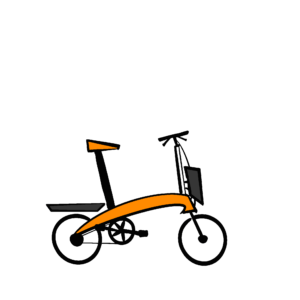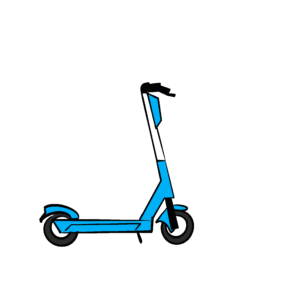
Founder of inclusive sustainable mobility organisation Loud Mobility, Georgia is full of enthusiasm for the fun, convenience and myriad benefits of all forms of micro-mobility, including cycling.
Working in Beijing was where Georgia found her love of utility cycling:
“The infrastructure was so amazing, it was all segregated, everybody cycled, and you felt really safe to do so. And most of the time, it was my best way to get from where I lived to my place of work or to meet friends. So I started really enjoying it there.”
In fact, Georgia enjoyed cycling so much that helping other people get the chance to cycle developed into a career:
“I was in really techie tech, like cloud computing. And then I went into travel tech… And then I combined like this love of travel, my kind of worries and fears and care of this huge impending issue of climate change that was really coming into my awareness at that time; cycling, and tech and ended up in bike sharing. And have been doing that for the last six or so years. Because I realised I just love bikes.”

Having recently been diagnosed with ADHD, Georgia realised her love of bikes and micro-mobility are connected to her neurodiversity:
“It is the connection between my love of cycling, and the ADHD that really shocked me and really surprised me… Because I’ve never really understood what it is about this space that just – I’ve been able to really connect and stick with it for six years after a career of just chopping and changing and finding ways to introduce my new interests into my space of work. But apparently, one of the really positive features of ADHD is that many of us really love bicycles… And cycling has absolutely been – not just from a work sense, but from a personal sense – a really important part of understanding my own disability, but also managing and finding ways that really helped me manage different symptoms of ADHD, through cycling and through the access that it gives me.”
As a Disabled woman of colour, Georgia sees barriers to cycling beyond the physical:
“The barriers that I think that are there tend to be in the category of representation, as well as infrastructure and feeling safe. Feeling physically and psychologically safe to participate in the world of cycling. You know, I think all of these categories or boxes that I could be put in, aren’t very well represented in cycling.”
And lowering those barriers? It can be cheap and simple:
Whether it’s finding a phone holder to allow easy navigation, or having spaces where people who understand your experiences can support you to try out different cycles and micro-mobility options, Georgia sees many easy routes to help people find the active travel options that work for them.
“if you look at the amount of funding that’s out there for electrifying the automotive world and supporting manufacturing, and all of these things that could be creating green jobs and a better climate and a better environment, if you shifted it towards the cycling space. But there is funding out there, it just needs to be getting into the hands of people that are able to really provide those smaller steps and lower barriers for people to start being able to access it at a broader scale.”
In fact, it’s really a simple way of thinking that’s needed, to make cycling and active travel more broadly more accessible for everyone:
“I think it all does come down to equity of space, making sure that there is the same hierarchy that is proposed in a lot of the documentation out there from national and local government that actually we prioritise the most vulnerable road users from pedestrians, to then cyclists, and then to cars, and start taking more of the space that is given up for cars and car centric cities, to people that are walking, wheeling and cycling.”

You can listen to the full chat with Georgia and the rest of our fortnightly My Cycle My Mobility Aid podcast series on our My Cycle My Mobility Aid podcast channel and download the transcript. We have campaigning resources and support available via our website at www.wheelsforwellbeing.org.uk , too
If you would like more information or to share your story for our campaign please contact Kate@wheelsforwellbeing.org.uk
